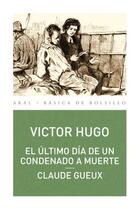Two overwhelming arguments against the death penalty.
In The Last Day of a Death Row and Claude Gueux, Victor Hugo makes a startling plea against the death penalty through the story of two prisoners awaiting execution. In the first, the condemned man writes a kind of diary in which he describes the desperation caused by uncertainty, loneliness, anguish and terror as the day of execution approaches. In the second, he is a poor worker with no resources who has been forced to steal to survive, who ends up being sentenced to death for rebelling against the harshness of the prison system and killing the director of the prison workshops. The description of the suffering of both characters supports Victor Hugo's belief that the death penalty has no positive value: it is unjust, inhuman and cruel, and the society that applies it is as responsible for a crime as any other.







